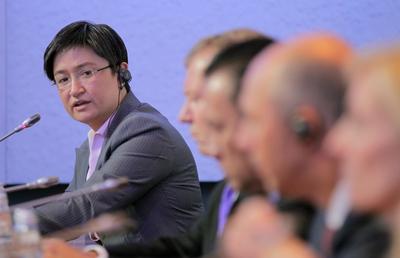SPARTANBURG, S.C. (AP) ? Carolyne Chelulei came to the United States from Kenya on a student visa for a college education, but now the Army is offering her the chance to stay for good as a citizen.
The 23-year-old is one of several hundred immigrants whose specialized skills, either in languages or in their professional background, make them eligible for a Pentagon program that repays service in uniform with an accelerated path to citizenship.
"I am excited about it," Chelulei said while visiting in her recruiter's office. "I like helping people, and I think I will be a great asset to America, to the Army."
As debate swirls in Washington about changing the nation's policies on immigration, the Army is going ahead with offering some legal immigrants living temporarily in the U.S. a path to citizenship if they can fill certain critical jobs.
It is formally known by a mouthful of Pentagon-speak: Military Accession Vital to the National Interest, or MANVI. The Army began the program on a one-year trial basis in 2009, recruiting 789 soldiers with language skills and 143 health care professionals, said Maj. Carol Stahl, the Army program's manager in the Pentagon. Since the program re-opened at the end of September 2012, 451 linguists have enlisted in the Army with 28 different languages, as well as 19 dentists and three physicians, she said.
While immigrants have long chosen military service as a way to qualify for citizenship, the new program was developed to speed up the process for specialties the military needs during times of conflict. That makes it easier to bring in medical professionals as officers, a rank where non-citizens cannot serve, or to pursue security clearances that non-citizens would also not qualify for.
Immigrants who qualify and agree to serve for a variable number of years can get on a fast track to citizenship. The process can be completed within weeks of putting on a uniform if they meet the multiplicity of requirements, officials say. The program is being used primarily by the Army, the nation's largest service. Other service braches could, but aren't doing so at present, Stahl said.
All those in the program serve some combination of duty for eight years, Stahl said.
People who enlist like Cheluei must agree to serve four years in active duty, and then may serve an additional four years as part of the reserves. While usually considered an inactive status, people can be recalled to full-time duty, as happened during the Iraq conflict. Doctors, however, enter as officers. They may choose between three years of active duty or six years in the reserves, and then another two in the inactive reserves.
All have the option to make a career of the military if they choose and remain for 20 years to reach retirement if they have a good service record, Stahl said.
"There are many qualifications for this program," said Army recruiting spokesman Leslie Ann Sully. "It's not for everyone. The positions, and languages we are looking for, can change from time to time."
Chelulei, who attended the University of South Carolina Upstate on a cross country scholarship, has what the Army is looking for: a college degree, excellent English as well as two African languages, and the willingness to serve at least four years in uniform as a behavioral health specialist and psychiatrist's aide.
She also had been in the United States legally for more than two years, had excellent scores on her Army entry exams and passed all security checks.
Among other skills, the military is looking for linguists who can speak dozens of languages. They can range from Chinese to Czech, Albanian to Uzbek, as well as Persian Dari, Farsi, Arabic or Yoruba, spoken in western Africa.
Chelulei says her family spoke Kalenjin in her Kenyan hometown of Eldoret, and she learned English and Swahili in elementary and secondary school. She was recruited for her willingness to enter the health care field, not her languages. But to the Army, the fact she is trilingual is a plus.
In health care fields, the Army also is seeking dentists, psychiatrists, several types of physicians, nurses and clinical social workers.
Miami physician Marco Ladino Avellaneda was born in Bogota, Columbia, and came to the United States on a visa to study medicine. Now, he is a major in the Army Reserves and a kidney specialist at the veterans' Medical Center in downtown Miami.
After joining the Army Reserves, Ladino Avelleneda got his citizenship papers in a month instead of the 10 years he expected, he said in a telephone interview. And he just completed a four-month deployment to Kosovo.
"This is my country now," the now 35-year-old says of the U.S.
Margaret Stock, an immigration attorney in Anchorage, Alaska, helped draft the program several years ago for the Pentagon while serving as an Army Reservist. Having immigrants in uniform has been a standard for the U.S. military since the Revolution, she said.
"In the 1800s, about 60 percent of the troops were immigrants, primarily Irish," Stock said in a telephone interview.
The Army's program allows the military a way to fill critical jobs at a time when linguists or medical personnel need to be on call at any time around the world, Stock said.
The attorney said one side effect of the political gridlock in Washington over fixing the nation's immigration system is that talented people who have something to offer America "can't get green cards to work in this country, even if they have a high degree in education."
To become a citizen, Stock said, "they have to wait years and years and years" to work through the complex path to citizenship.
"Let's face it, the immigration system in our country is broken," said Stock. "By the time some of these people might be eligible for citizenship, they would be too old" to be eligible for the military.
Stahl and Sully both stressed that the program doesn't create any right to citizenship.
Under federal law, non-citizens who serve honorably in the military during times of combat may seek citizenship on an accelerated basis. The acceleration comes because many of the applicants are already highly educated and are able to complete their paperwork, tests, and interviews with the U.S. Citizenship and Immigration Services in a timely fashion, said Sully.
And those who enter the enlisted ranks must still go through basic training like any other soldiers. Doctors and many medical specialists enter the service as officers after completing weeks of officer training, Sully said.
Chelulei's recruiter, Sgt. Keawanyda Speaks, said she had to assure the African student-athlete that she would be able to do well in basic training, given her physical capabilities and stamina as a runner.
"I told her that if I could do it, she could do it," the 27-year-old sergeant said with a laugh.
Asked about the potential for women to be placed into combat situations during her service, Chelulei just shrugged her shoulders. "I don't think it will be a problem," she said.
Immigrants who entered the United States illegally are not allowed into the program. Nor will the military help anyone outside the United States apply for a visa or enter the United States in order to enlist.
And if a soldier or Army officer doesn't complete their years of enlistment, their citizenship can be revoked.
"It's a way for the Army to increase our readiness," said Stahl.
---
Susanne M. Schafer can be reached on Twitter at
http://twitter.com/susannemarieap
Source: http://news.yahoo.com/us-army-offers-citizenship-track-needed-skills-131307313.html
night at the museum pope shenouda bolton muamba sxsw crystal cathedral st. patrick s day brandon lloyd





 ?
?





